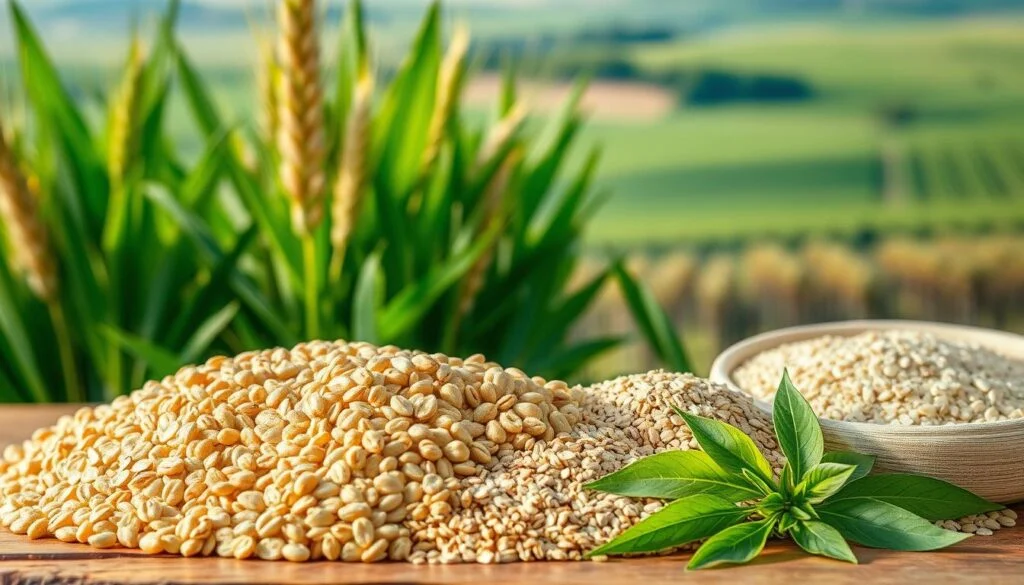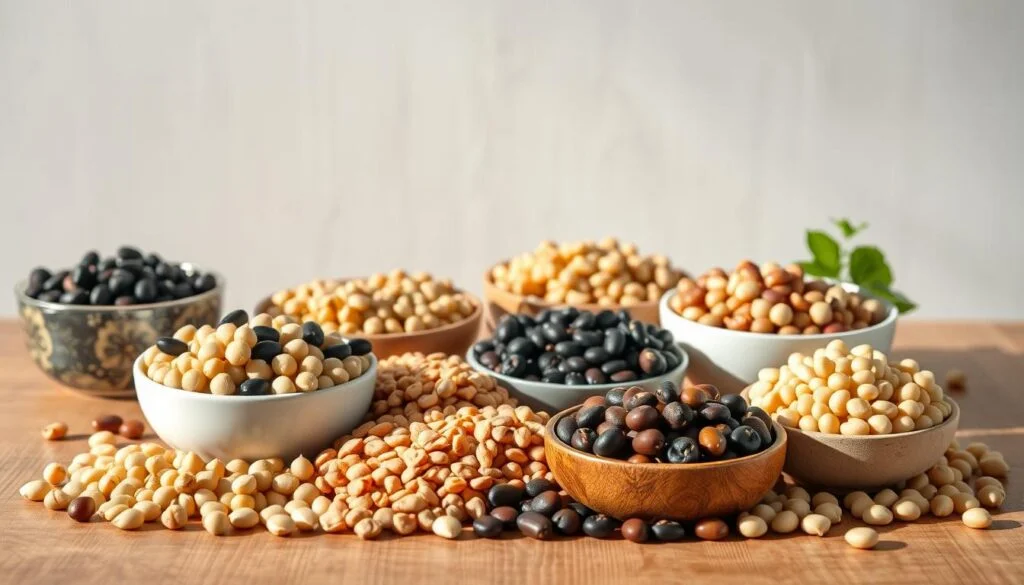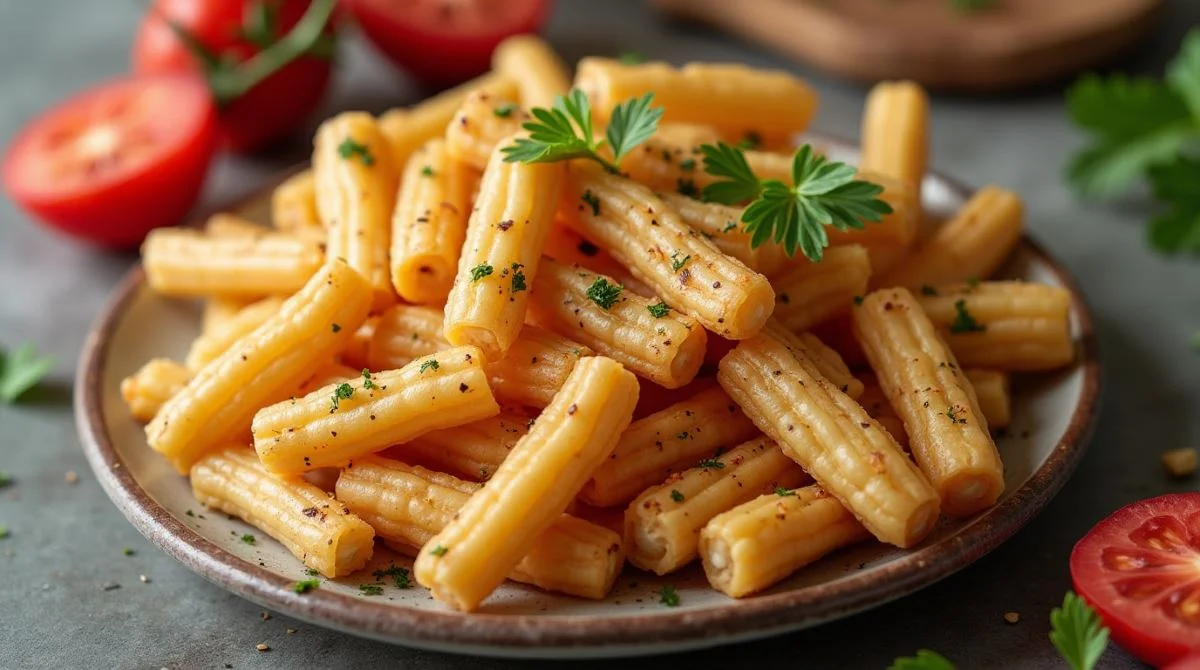Foods That Have High Carbs: Complete Guide for You
Table of Contents
Carbohydrates are key nutrients that power your body every day. Knowing which foods are high in carbs helps you make better food choices. Your body uses carbs to turn glucose into energy for your cells, tissues, and muscles.
Every day, high-carb foods are vital for giving your body the fuel it needs. Foods like whole grains, fruits, and vegetables are full of energy. They help you perform physically and mentally. Learning about these foods can help you eat well and reach your health goals.
Nutrition experts say carbs should make up 45% to 65% of your daily calories. This means choosing carbs that are not just energy sources but also packed with nutrients. By diving into the world of high-carb foods, you can make smarter diet choices.
Whether you’re active or not, knowing about carbs is important. In this detailed guide, we’ll look at various high-carb foods, their nutritional values, and how they help your health.
Understanding Carbohydrates and Their Role in Your Diet
Carbohydrates are key nutrients in our diet. They give us energy, help our brains work well, and keep us healthy. Knowing how carbs work helps us eat better.
Types of Carbohydrates
Carbohydrates are mainly three types:
- Simple Carbohydrates: Quick energy sources like fruits and sugars
- Complex Carbohydrates: Starchy foods that provide sustained energy
- Dietary Fiber: Supports digestive health and helps regulate blood sugar
Daily Recommended Carbohydrate Intake
Your carb needs depend on several factors. The FDA says eat 275 grams of carbs in a 2,000-calorie diet. Carbs should be 45-65% of your daily calories.
Intake varies by gender and activity level:
- Men: 60-75 grams per meal
- Women: 45-60 grams per meal
How Carbohydrates Affect Your Body
Carbohydrates are our main energy source. The brain uses 20-40% of carb energy. Starchy foods and carb-rich foods keep blood sugar stable and provide nutrients.
Choosing whole food sources of carbohydrates can significantly impact your overall health and wellness.
Remember, not all carbs are the same. Whole grains, veggies, and legumes are better than processed carbs.
Foods That Have High Carbs: Essential Knowledge
Knowing about high-carb foods is key for a balanced diet. Carbs give your body energy. It’s important to know which foods are high in carbs to make good food choices.
Let’s look at some main high-carb food groups:
- Whole Grains: Quinoa, brown rice, and oats are high in carbs
- Legumes: Chickpeas and lentils are good carb sources
- Fruits: Bananas and other fruits are full of natural sugars
- Starchy Vegetables: Sweet potatoes and corn are rich in carbs
It’s vital to know the difference between good carbs and bad carbs. Nutrient-rich carbs give you energy and extra health benefits. For example, one cup of cooked quinoa has 39.4 grams of carbs and lots of fiber and protein.
Keeping track of carbs is important for good nutrition. Adults need about 135 grams of carbs a day. Most should get 45-65% of their calories from carbs, which is 200-300 grams daily.
Pro tip: Choose whole, unprocessed carbs for the most nutrition.
Not all sugary foods are bad. Some carbs are full of nutrients, while others can raise blood sugar and offer little nutrition. Pick the right carbs to keep your health and energy up.
The Impact of Processing on Carbohydrate Quality
It’s important to know how food processing changes high-carb foods. This knowledge helps us make better food choices. The processing of bread and other carbs can greatly affect their health benefits.
Refined vs. Unrefined Carbohydrates
Carbs in high-carb foods vary in quality. Refined carbs lose nutrients and fiber during processing. Bread is a good example:
- Whole grain bread keeps the whole grain kernel
- White bread loses the nutritious bran and germ
- Processing cuts down on nutrients
How Processing Affects Nutritional Value
Processing can greatly change a food’s nutritional value. Refined grains miss out on important health benefits:
| Nutrient Component | Whole Grain | Refined Grain |
|---|---|---|
| Fiber | High | Low |
| Vitamins | Complete | Reduced |
| Minerals | Complete | Minimal |
Eating too much of processed carbs can lead to health problems. The Dietary Guidelines for Americans suggest limiting added sugars to less than 10% of daily calories for good health.
Choosing whole, unprocessed high-carb foods can provide more nutritional benefits and support long-term wellness.
Common Sources of Healthy Complex Carbohydrates
Complex carbohydrates are full of energy and nutrients. They are key for a balanced diet and good health.
Looking at healthy carbs, some foods really stand out:
- Whole grains like quinoa and brown rice
- Legumes and beans
- Starchy vegetables
- Pasta made from whole grains
Quinoa is a top choice for complex carbs. It has all nine essential amino acids and gives lasting energy. One cup of quinoa has about 39 grams of complex carbs, making it great for meals.
| Food Source | Carbohydrate Content | Additional Benefits |
|---|---|---|
| Whole Grain Pasta | 40-50g per serving | Higher fiber, more vitamins |
| Brown Rice | 45g per cup | Rich in manganese, selenium |
| Legumes | 40-60g per cup | High in protein, iron |
To stay healthy, choose unrefined complex carbs. They give steady energy, help digestion, and boost long-term health.
Starchy Vegetables and Their Carbohydrate Content
Starchy foods are key in our diets, giving us important nutrients and energy. They are full of complex carbs that do more than just add calories. Knowing what they offer can help you choose better foods.
Starchy vegetables are different because they have more carbs than other veggies. They are rich in complex carbs, which are great for energy.
Potatoes and Sweet Potatoes: Nutritional Powerhouses
Potatoes are a favorite starchy food, with a medium white potato having over 30 grams of carbs. Sweet potatoes also have a lot of carbs, about 20 grams per 100 grams. These veggies are not just carbs; they also have vitamins and minerals.
- White potatoes: 17 grams of carbs per 100 grams
- Sweet potatoes: 20 grams of carbs per 100 grams
- Rich in nutrients like vitamin C, potassium, and fiber
Corn and Other Starchy Vegetables
Corn is a big starchy veggie, with about 19 grams of carbs per 100 grams. Other starchy veggies include:
- Cassava: 38 grams of carbs per 100 grams
- Plantains: 32 grams of carbs per 100 grams
- Yams: 28 grams of carbs per 100 grams
- Taro: 27 grams of carbs per 100 grams
Optimal Portion Sizes
Experts say we should eat 4 to 6 cups of starchy veggies a week. Here are some serving sizes:
- Potatoes: 1 small potato or 1/2 cup mashed
- Sweet potatoes: 1/2 cup
- Corn: 1/2 cup or 1 medium cob
- Butternut squash: 3/4 cup
Pro tip: Cooking and cooling starchy veggies can boost resistant starch. This may help control blood sugar and offer health perks.
Whole Grains as High-Carb Food Sources

Whole grains are packed with nutrients and are great for your health. Rice is a standout grain that’s both versatile and full of nutrients. Unlike refined grains, whole grains give you a complete set of health-boosting nutrients.
When looking at high-carb foods, remember these nutritional powerhouses:
- Brown rice: 46 grams of total carbs per cup
- Quinoa: 34 grams of net carbs per serving
- Oats: 23 grams of net carbs per serving
- Barley: 41.5 grams of net carbs per serving
Whole grains are full of important nutrients that help your health. They offer more than just carbohydrates – they give:
- B vitamins for energy metabolism
- Vitamin E for cellular protection
- Fiber for digestive health
- Complex carbohydrates for sustained energy
“Choosing whole grains over refined options can significantly improve your nutritional intake and overall wellness.” – Nutrition Experts
When picking high-carb foods, choose whole grains like rice that keep their natural nutrients. Brown rice, for example, has more fiber and nutrients than white rice. Your body will appreciate these smarter grain choices.
Fruits and Natural Sugar Content
Fruits are full of vitamins, minerals, and natural sugars. They are nature’s sweet powerhouses. Knowing how much carbs they have helps you make better food choices.
Fruits are not just simple sugars. They add unique nutrients to your diet. Each fruit has its own nutritional benefits.
High-Carb Fruits to Monitor
- Bananas: 27 grams of carbohydrates per medium fruit
- Mangoes: 25 grams of carbohydrates per cup
- Pineapple: 22 grams of carbohydrates per cup
- Raisins: 22 grams of carbohydrates per small box
- Apples: 25 grams of carbohydrates per medium fruit
Best Ways to Include Fruits in Your Diet
The USDA says to eat 1.5 to 2 cups of fruit every day. Strategic fruit consumption can help manage your carbohydrate intake. Here are some tips:
- Pair fruits with protein to slow sugar absorption
- Choose fruits with lower glycemic index
- Opt for whole fruits over juices
- Practice portion control
Fruits like cherries (GI of 20) and grapefruit (GI of 26) don’t raise blood sugar much. By knowing the carbs and glycemic index, you can enjoy fruits and keep your diet balanced.
Processed Foods High in Carbohydrates to Limit
Finding healthy foods can be tough, especially with so many processed options around. Refined cereals and processed foods often hide sugars and empty calories. These can mess up your diet plans.
Processed foods high in carbs can harm your health. Studies reveal that refined carbs have up to five times more sugar than natural foods. They also cause blood sugar to rise quickly.
- Sugary beverages
- White pasta
- Refined breakfast cereals
- Pastries and sweet snacks
- Packaged cookies
When picking cereals and other high-carb foods, check the labels carefully. Look for options with:
- Minimal added sugars
- Higher fiber content
- Whole grain ingredients
- Lower glycemic index
The dietary guidelines suggest cutting down on refined carbs and choosing whole grains instead. For a 2,000-calorie diet, aim for 225-325 grams of carbs. Focus on complex carbs.
| Processed Food | Carb Content | Health Impact |
|---|---|---|
| White Bread | 14g per slice | High glycemic index |
| Soda | 39g per 12oz | Empty calories |
| Packaged Cookies | 22g per serving | Low nutritional value |
Making smart choices about processed high-carb foods can greatly improve your nutrition and health.
Legumes and Beans: Nutritious High-Carb Options

Legumes and beans are packed with nutrients and carbs. They give you more than just carbs. They also have essential nutrients for your health. A half cup of cooked beans has about 20-24 grams of carbs and 7-10 grams of fiber.
Adding these foods to your diet is very beneficial. Beans and legumes are full of complex carbs. They give you steady energy and help control blood sugar. They’re great for those looking for balanced nutrition.
- Black beans: Rich in protein and fiber
- Chickpeas: Excellent source of plant-based protein
- Lentils: Quick-cooking and nutrient-dense
- Kidney beans: High in antioxidants
Start with small amounts of legumes to avoid stomach issues. Rinse canned beans or soak dried ones to cut down sodium and improve digestion. Gradually increase your intake to help your body adjust.
Pro tip: Combine beans with whole grains to create complete protein meals that support muscle health and sustained energy.
Nutritionists say to eat 1/2 to 1 cup of legumes a few times a week. These foods are not just carb-rich. They also help your heart, manage weight, and keep blood sugar stable.
Making Smart High-Carb Food Choices
Finding the right high-carb foods can be tough. It’s key to pick wisely to keep your diet balanced. What you eat greatly affects your health and nutrition.
Smart eating means knowing what you eat. Reading food labels and controlling portions helps you choose better. This includes making smart choices about bread and other high-carb foods.
Reading Food Labels Like a Pro
Food labels guide you through carbs. Look closely at these parts:
- Total carbohydrate amount
- Dietary fiber content
- Added sugars
- Serving size
Portion Control Strategies
Controlling carbs needs smart portion control. Here are tips to manage high-carb foods:
- Use smaller plates to naturally reduce portion sizes
- Measure bread and grain servings
- Fill half your plate with non-starchy vegetables
- Choose whole grain options when possible
| Carbohydrate Type | Recommended Daily Intake | Best Sources |
|---|---|---|
| Complex Carbohydrates | 45-65% of daily calories | Whole grains, beans, vegetables |
| Fiber | 25-30 grams | Fruits, vegetables, whole grains |
| Simple Carbohydrates | Limit intake | Sugary drinks, processed snacks |
Pro tip: Always compare nutrition labels and choose foods with higher fiber content and lower added sugars.
Reach more ideas bellow:
Conclusion
Knowing which foods have high carbs is key to a balanced diet. You’ve learned that not all carbs are the same. Choosing high-carb foods that are also nutritious can boost your health and energy.
Choosing foods like quinoa, sweet potatoes, and brown rice is smart. They give you important nutrients and keep your energy steady. Adding lean proteins to these foods helps control blood sugar and keeps you full longer. Always remember to control your portions and choose high-quality foods.
Focus on eating whole, unprocessed foods high in carbs. Foods like chickpeas, lentils, and whole grains are full of fiber, vitamins, and minerals. They help your digestion and keep you healthy for a long time. By making smart food choices, you can use carbs to fuel your body well and stay healthy.
You can know about a list of diets on this link.

